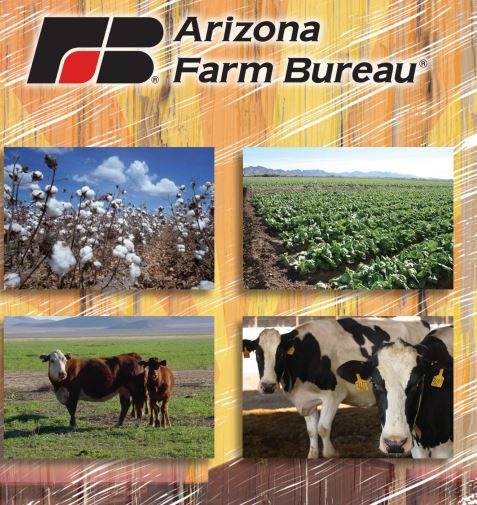The Economic Contributions of Arizona Agriculture
Published
9/17/2015
By Joseph Sigg, Arizona Farm Bureau’s Government Relations Director: The following, are remarks given at this week's Arizona Agriculture Water Summit.
So when the Honorable Mr. Lavis assigned me the task of the economic report, he thought he was consigning me (actually punishing me) to the recitation of a bunch of boring statistics.
Of
But what he forgot was the delivery. Recently I passed a magic birthday where the sideboards come down, the filters come off and I can say anything …

Arizona agriculture is a $17.1 billion industry. Approximately half of that economic value comes from livestock and the other half from crop agriculture. And, while the USDA counts 20,005 farm units only 1% produce 75% of agriculture sales.
So if you object to anything I say or the way I say it, I am not responsible and I am not entirely well.
You … all of you, collectively,
We began having these third party studies done with the thought that while we set the table, we won’t get to sit at the table unless we quantify ourselves.
The most recent
And that first report, 22 years ago said our future would rest mostly on how we dealt with water and power issues – and so - we are here.
You are a $17 billion dollar industry, and it varies, about half livestock and half crops; and
But let’s not forget size specialization and locally grown has taught us focus, vertical integration, direct marketing and the reason why we must pay close attention to the consumer.
Agriculture comes into the economic conversation after tourism, health care, high tech and mining, so you have top tier company.
You manage three-fourths of the land in this state, and use, as an economic unit of production about two-thirds of the water – I needn’t remind you of your
And please remember – you don’t use water – you make stuff with it – you generate products and commerce. For
In addition to lecturing with a desire to penalize the productive, why is it that agriculture is supposed to ignore economies of scale in our economics. Sometimes I think that is an economic story.
And then there is this amazing gem: The Department of Water Resources indicates over the entirety of the state we use just about as much water as we did in 1957. Agriculture and its efficiencies are one of the big folks in this conversation.
Arizona had 1.1 million people in 1957 and today we are 6.7 million plus. Six times the people and the same amount of water used – it’s a remarkable statistic on many fronts.
In a recent interview, my good friend Steven Bales said the best thing you can put into the land is your boots. That is a characteristic you all understand and it explains much of your economic success.
The second thing is your embrace of technology.
Don’t ask me how or why but I came across this quote from the November 1911 issue of Twentieth Century Magazine: “There is no money in growing ordinary crops nor in growing any crops in
Mind you this was before the huge leaps of the green revolution, and we are in the tsunami of the next. The 1911 author of this statement was predictive of outcomes, but he had not a clue as to what would transpire. How could he? It’s not simply astounding what you do, but how you do it.
People directly involved with their operations, technology combined with infrastructures of backward linking supply inputs and forward linking processing and markets makes this a $17 billion industry.
And then this last thing that makes you an economic marvel. This realization – this understanding that regardless of what you produce – whether for traceability, marketing advantage, food safety or public choice … either your name is on the box or your reputation is on the line.
I could say your cojones are on the line, but my boss said I could not say that.
It used to be just the vagaries of weather, disease or market news. Now there is a direct line between your operations and your production to public acceptance.
One of the things I believe the public often misses about our industry is we have either a responsibility or ethics gene … or both. We have to be economic and accountable. I have grown tired of the words “sustainable” and “transparent” – but there it is we need both to be viable.
Thank you.